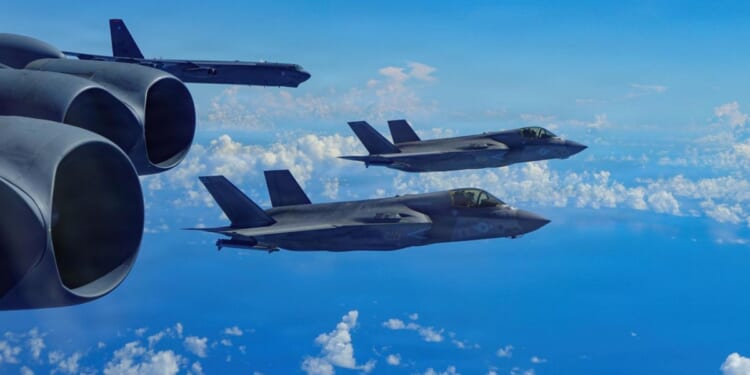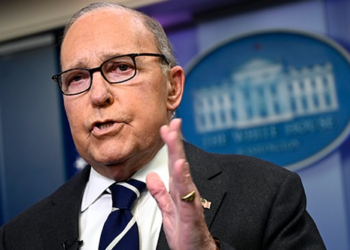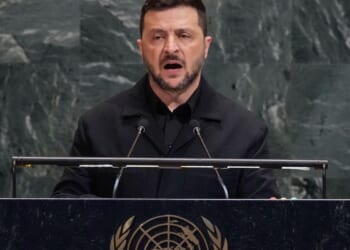
Legal scholars say the Trump administration may have a solid argument that international drug cartels are using narcotics as de facto weapons of war and are targeting the U.S. with the intent of doing physical harm — in the form of drug addiction — to its citizens.
That rationale, analysts say, seems to be the Trump administration’s best legal defense as it strikes alleged drug boats off the coasts of Central and South America, even while simultaneously insisting that the U.S. technically isn’t at war and doesn’t need the approval of Congress to continue its deadly anti-drug campaign.
So far, the U.S. has struck at least 16 alleged drug boats and killed at least 64 people in the process, all of whom the administration has deemed “narco-terrorists.” The strikes have come amid significant criticism at home, including from lawmakers of both parties, and abroad. Top officials at the United Nations, for example, recently said the administration is violating international law and carrying out extrajudicial killings.
Retired Air Force Maj. Gen. Charlie Dunlap, now the executive director of the Center on Law, Ethics and National Security at Duke University Law School, said that the administration is prosecuting its war on drug boats under a “law of war regime,” which differs from the previous law enforcement legal regime under which the U.S. Coast Guard for years has interdicted boats suspected of carrying drugs.
The administration argues that it is engaged in armed conflict with non-state actors — in this case, drug cartels — whom the U.S. has deemed unlawful combatants. Mr. Trump also has designated some drug cartels as foreign terrorist organizations.
Those definitions give the president some authority to conduct a military campaign but also carry specific conditions that must be met for the argument to pass legal muster over the long term.
SEE ALSO: Trump says ICE raids haven’t gone far enough; he won’t say if he’ll strike Venezuela
“International law requires that there be sufficient organization of these non-state actors, as well as a certain intensity of the conflict, and here’s where we get into some pretty complicated legal thoughts,” Mr. Dunlap said recently in an exclusive interview on the Threat Status weekly podcast.
“Is this an armed conflict? I think a case could be made — we haven’t really heard any details from the administration — that drugs are in essence an arm. We do have a chemical weapons treaty, so the idea of chemicals being weaponized is not new. Some might say, ’Well, wait a second, they’re not trying to kill anybody.’ Maybe not, but they certainly are intending to harm people, especially with cocaine. They want to create addicts,” Mr. Dunlap said of the drug cartels allegedly targeted by the U.S. strikes.
A ’dangerous’ legal stretch?
Behind the scenes on Capitol Hill, the Justice Department reportedly is arguing that the drug cartels are akin to extremists targeting the U.S., with their weapons of choice being narcotics rather than bombs, guns or other more traditional terrorist tools. Several media outlets have reported that top Justice Department officials made the case to top lawmakers that America is technically not at war, because its military is not under attack, and therefore the 1973 War Powers Resolution does not apply. That law requires a president to seek congressional approval, get an extension or halt hostilities 60 days after beginning military strikes.
The administration has given no indication it will seek any formal congressional approval to continue its campaign.
Presidents have broad discretion over military matters under Article II of the Constitution. But arguing that the U.S. isn’t at war and that its military is not under attack, but that non-state actors are still targeting the American homeland and must be preemptively struck by American forces, appears to be a very tricky legal tightrope to walk.
“The closest analogy is the ongoing armed conflict against al Qaeda and its affiliates. … That’s been the legal basis, across five presidential administrations now, for lethal force and detention of al Qaeda fighters. The Trump administration seems to be applying that same template, but this time against drug cartels instead of a transnational terrorist group. But that’s a dangerous stretch,” Matthew C. Waxman, an adjunct senior fellow for law and foreign policy at the Council on Foreign Relations, wrote in a recent analysis.
“Al Qaeda had declared war on the United States and attacked U.S. warships, embassies, military headquarters and financial capital, killing thousands of Americans with the equivalent of missiles. If a state had carried out those attacks, no one would dispute that we were in a war,” he said. “Part of the problem is that the Trump administration has been so opaque about its legal basis and about the facts surrounding its recent strikes. That’s a mistake that exacerbates the legal problems.”
Mr. Dunlap agreed. He argued that the administration has not offered a convincing legal case for its actions, at least not publicly.
Critics say the Trump administration is setting a dangerous precedent by killing alleged narco-terrorists without providing an air-tight legal case to Congress, the American people and the United States’ international allies.
Congress on the sidelines
Administration officials say their rationale is clear.
“So, the rationale is quite simple: It’s self-defense of the American people,” Defense Secretary Pete Hegseth told The Washington Times in a recent exclusive interview. “We have been poisoned. Our kids have been poisoned. Our communities have been poisoned, and we’ve allowed it to happen because, for some reason, we weren’t willing to look holistically or seriously at the problem.”
The operations are “not extrajudicial,” as some critics assert, Mr. Hegseth said.
“We’ve got a lot of lawyers and a lot of process that’s looking at it with the who and the why, and we’re working with Congress to make sure they have that information,” he said.
But Congress isn’t convinced. Once again, lawmakers are left in a position to stand by and watch as an administration conducts military actions abroad with little input from the House and Senate. That scenario has played out repeatedly in the post 9/11 era under presidents of both parties, when authorizations for use of military force and other war powers have been stretched by commanders in chief who, for a variety of reasons, chose not to seek formal congressional approval for military actions around the world.
Last week, Sen. Roger Wicker, Mississippi Republican, and Sen. Jack Reed, Rhode Island Democrat, the chairman and ranking member on the Senate Armed Services Committee, respectively, publicly released two letters they have sent to Mr. Hegseth that seek clarity on the legal rationale for the strikes.
The Oct. 6 letter, they said, “requests any written opinion from the Department of Justice’s Office of Legal Counsel regarding the domestic or international legal basis for these operations and strikes, and a complete list of all designated terrorist organizations and drug trafficking organizations with whom the president has determined the United States is in a non-international armed conflict and against whom lethal military force may be used.”
As of Friday, the senators said they have not received those documents.
The administration also reportedly held a closed-door briefing on the matter last week but excluded congressional Democrats. As a result, some lawmakers are questioning the foundation of the arguments being made by the administration.
“We’re all saying, come clean. And the fact is, if, as the administration says, these are all bad guys, and yeah, they’re all drugs on these boats, interdict these boats and show the world,” Sen. Mark Warner, Virginia Democrat and vice chairman of the Senate Intelligence Committee, said on CBS’ “Face the Nation” program over the weekend.
“If you are going to try to make a case to the American public, make it publicly, don’t do this and then try to hide the legal justification and give it out only on a partisan basis,” Mr. Warner said.
Some Republicans have been equally critical.
“The drug war … or the crime war has typically been something we do through law enforcement. And so far, they have alleged that these people are drug dealers. No one said their name. No one said what evidence. No one said whether they’re armed. And we’ve had no evidence presented,” Sen. Rand Paul. Kentucky Republican, said recently on “Fox News Sunday.”
“So, at this point, I would call them extrajudicial killings,” Mr. Paul said. “And this is akin to what China does, to what Iran does with drug dealers. They summarily execute people without presenting evidence to the public. So, it’s wrong.”










